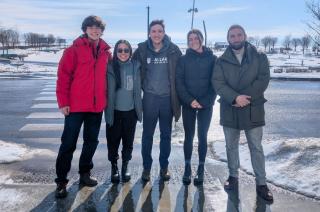AI and CSR can help fight corporate corruption, says PhD student Oludolapo Makinde

Allard Law
Apr 7, 2022

Corporate corruption is a global problem that may cost up to five percent of the world’s GDP each year. And as Allard Law PhD student and Liu Scholar Oludolapo Makinde points out, Canada’s own ranking in Transparency International’s Corruption Perception Index has slipped in recent years.
As part of her doctoral research, Oludolapo is examining the benefits that can be gained when corporations adopt the right internal anti-corruption mechanisms — specifically, incorporating artificial intelligence and corporate social responsibility frameworks into corporate governance processes.
Before joining us at Allard Law, Oludolapo completed her LLB at the University of Lagos, Nigeria, and worked as a Legal Associate at Kenna Partners, a leading Nigerian law firm. She went on to complete an LLM at Allard Law, focusing on corporate governance, before beginning her PhD. In 2019, Oludolapo was commissioned to write the report Towards a Healthy City: Addressing Anti-Black Racism in Vancouver for the City of Vancouver, which outlines key actions to combat anti-Black racism and has contributed to ongoing municipal action. In 2020, she worked as a Researcher at the Cullen Commission of Inquiry into Money Laundering in BC.
In this interview, Oludolapo shares a bit about her time at Allard Law and her dissertation research.
Tell us about your path to a PhD. What led you to pursue a doctorate at Allard Law?
I really enjoyed doing my LLM degree at Allard Law. My thesis essentially covered a comparative analysis of Nigerian and Canadian corporate governance frameworks, and I wanted to expand on this research by looking at corporate governance, corporate social responsibility, and artificial intelligence as anti-corruption tools. I was excited to continue this research at Allard Law with my supervisor, Dr. Carol Liao, and in the beautiful city of Vancouver.
What draws you to the study of corporate governance in particular?
I believe companies wield tremendous power in terms of the way corporate activities not only affect the economy, but also the day-to-day lives of the average person. Knowing this, it is imperative that we pay close attention to how companies are governed.
As James Wolfensohn, a former president of the World Bank, said, “the proper governance of companies will become as crucial to the world economy as the proper governing of countries.” For me, corporate governance is an important concept to study as it affects a myriad of issues, from climate change and human rights, to corruption.
What’s one thing you’ve learned through your research that you wish was more widely understood?
One thing I wish was more widely understood is that although many countries in the Global South rank low on Transparency International’s Corruption Perception Index, and it’s often thought that corruption in these countries is mostly a function of corrupt activity involving nationals, countries in the Global North, like Canada, actually exacerbate the corruption problem. This is particularly true when multinational corporations operating in the Global South engage in corrupt activity in host countries — what Transparency International terms “exporting corruption.” An example that illustrates this point is the case involving Griffiths Energy International (GEI), a Calgary-based energy company that paid out a $2 million “consulting” fee to a company owned by the wife of the Chadian ambassador to Canada, in order to facilitate entry into Chad’s energy market.
So, it’s not enough that Canada ranks high on the Corruption Perception Index — although this ranking has fallen in recent years — it’s important that we do not contribute to corrupt activity in other countries.
You recently wrote about how AI and corporate social responsibility can help tackle corruption. What are some of the pros and cons of this approach?
This article is essentially a part of my doctoral research. When we talk about mechanisms to address corporate corruption, we often think about laws or treaties such as the Corruption of Foreign Public Officials Act or the Organisation for Economic Cooperation and Development Anti-Bribery Convention, but there’s also so much to gain by looking inwards within the corporation.
CSR is one of such internal mechanisms. Using CSR as an anti-corruption tool reinforces that companies have to go beyond the bare minimum by not just complying with anti-corruption legislations or treaties but also viewing anti-corruption as a social responsibility. Doing so will centre transparency and accountability at the heart of a company’s operations and communicate to stakeholders and shareholders that the company places a premium on these values. There’s also a number of benefits that can be derived from utilizing AI as an anti-corruption tool, especially considering its capacity to detect corrupt activities at a much faster rate than is humanly possible. If we then couple CSR and AI, we have a framework where CSR can help establish a culture of transparency and accountability within the company while AI mechanisms can assist in implementing these values within the organization.
As with many similar frameworks, however, there are challenges that arise with AI’s use — possible privacy violations, concerns that AI may replicate hidden biases, and that AI may be used in itself to facilitate corrupt activities among others. These concerns must be taken into account when designing an AI-based anti-corruption framework.
What impact do you hope your research has beyond academia?
Corruption is such a complex problem that is difficult to eradicate, but I’m hopeful that my research will contribute to collective efforts seeking to address the problem. In conducting this research, my goal is to provide useful suggestions to companies on how to mitigate bribery and corruption risks using tools they are already familiar with. Corporate governance and corporate social responsibility measures are part and parcel of corporate activity, and we see companies utilizing AI in decision-making processes. Despite this, many companies haven’t considered that these tools, used jointly, can enhance anti-corruption processes. My research hopes to make a case for companies to do so.
What have you enjoyed or found most rewarding about your time as a PhD student so far?
For me, I’ve found connecting with fellow graduate students, staff, and professors at Allard Law most rewarding. I especially enjoy the freedom I have as a PhD student to think about and explore ideas and topics that interest me and to discuss these ideas with fellow researchers. I’ve also enjoyed working as an External Relations Student Coordinator, along with Alumni Relations Manager Lindsay Cashin and Communications Manager Heidi Wudrick. In this role, I’ve had the opportunity to delve into Communications, a field I have always been interested in, and loved meeting and interviewing Allard Law alumni. It’s always refreshing to connect with alumni and get to hear and write about their time at the law school and their legal journey afterwards.
- Allard School of Law
- Graduate Programs
- Research


